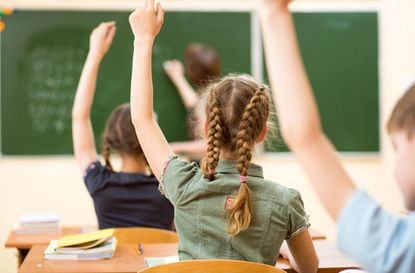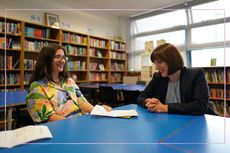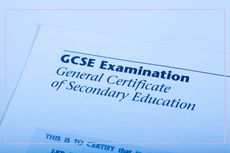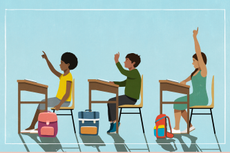Should all primary school children have sex education?
A new report from MPs says that the current system is "weak", and sex education needs to be improved in 40% of schools - but would you be happy for you child to be taught sex education from the age of 5?


A new report from the Education Select Commitee has stated that all state primary and secondary schools should be required to teach sex and relationship education - a recommendation which would affect children as young as 5.
Committee chairman Graham Stuart MP defended the statement, saying that 'young people have a right to information that will keep them safe'.
'There is an overwhelming demand for statutory sex and relationships education – from teachers, parents and young people themselves,' he explained. 'It’s important that school leaders and governors take PSHE seriously and improve their provision by investing in training for teachers and putting PSHE lessons on the school timetable. Statutory status will help ensure all of this happens.'
Research from the report showed concerning flaws in the current system, including children not being able to name certain body parts, and not understanding the concept of consent. It is hoped that making sex education part of the curriculum early on will help prevent issue such as STIs, teenage pregnancy, cyberbulling and exploitation in later life.
Do you think 5 is too young for sex education to start? Would you withdraw your child from such classes? Let us know in the comments below
In March 2013, a similar review took place, and it was decided that sex education should remain a 'non-compulsary subject' - but Ofsted reports have since shown that 40% of schools still require improvement in this area.
At present, primary schools are only required to teach basic biology, while secondary schools are required to cover sexually transmitted diseases with pupils aged 14-16 - but many political figures feel that more information is needed.
GoodtoKnow Newsletter
Parenting advice, hot topics, best buys and family finance tips delivered straight to your inbox.
A Department of Education spokeswoman said: 'We want to see all young people leave school prepared for life in modern Britain. This means not only ensuring that young people receive a rigorous academic education, but also helping them to develop personal and emotional well-being.'
'High quality PSHE teaching has a vital role to play in this – giving young people a better understanding of the society around them and supporting them to make informed choices and stay safe.'
Under the new system, parents would retain the right to withdraw their children, and be encouraged to consult with teachers to understand exactly what is being taught and how.
No final decision has been made as of yet, but the government has said that it will consider the findings of the report carefully.
Trusted, informative, and empathetic – GoodToKnow is the ultimate online destination for mums. Established in 2007, our 15-year-strong archive of content includes more than 18,000 articles, 1,500 how-to videos, and 7,000 recipes.
-
 I tested the Lakeland Dual Basket air fryer and it made midweek family cooking a breeze
I tested the Lakeland Dual Basket air fryer and it made midweek family cooking a breezeYou can’t go wrong with the dual basket air fryer by Lakeland complete with easy-view windows to ensure burnt food is a thing of the past…
By Jessica Dady Published
-
 Reframing one simple habit could get your sex life back on track after having a baby, new research shows
Reframing one simple habit could get your sex life back on track after having a baby, new research showsMany parents struggle to get their sex life back on track after having a baby, but new research has shown how one simple habit could make all the difference.
By Ellie Hutchings Published
-
 When will A-Levels be scrapped? Everything to know about the Advanced British Standard
When will A-Levels be scrapped? Everything to know about the Advanced British StandardEverything you need to know about the new qualifications that are set to replace A-Levels.
By Ellie Hutchings Published
-
 When do kids go back to school after the Christmas holidays? 2024 school holiday and term dates
When do kids go back to school after the Christmas holidays? 2024 school holiday and term datesThe key dates that you’ll want to pop on your calendar
By Ellie Hutchings Last updated
-
 How to appeal A Level results and when does clearing open?
How to appeal A Level results and when does clearing open?Find out how to appeal A Level results and when does clearing open with this helpful guide to get you through results day
By Grace Walsh Published
-
 GCSE results 2023: When are GCSE certificates issued?
GCSE results 2023: When are GCSE certificates issued?GCSE results are a nerve-wracking time, but once out the way you might find yourself asking when are GCSE certificates issued?
By Ellie Hutchings Last updated
-
 What to expect on A level results day - a parents guide
What to expect on A level results day - a parents guideWe explain what to expect on A level results day, how to understand their results and what to do if they didn't get what they wanted
By Gemma Chandler Published
-
 When do kids break up from school? Summer holidays 2023
When do kids break up from school? Summer holidays 2023It's the final term before the long summer break!
By Emily Stedman Last updated
-
 How to appeal a school place: what to do if your child doesn’t get the school you wanted
How to appeal a school place: what to do if your child doesn’t get the school you wantedGetting your child into the school you really want for them can be a nail-biting time for parents. Here's how to appeal if your child doesn't get in...
By Emily Stedman Published
-
 179 fantastic facts for kids to really blow their mind - from sharks and cats to space and tornadoes
179 fantastic facts for kids to really blow their mind - from sharks and cats to space and tornadoesDazzle and amaze little ones with these mind-blowing facts… They’re so good they’ll leave grown-ups speechless too!
By Joanne Lewsley Last updated